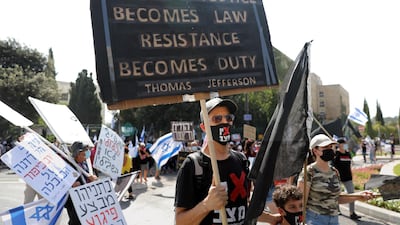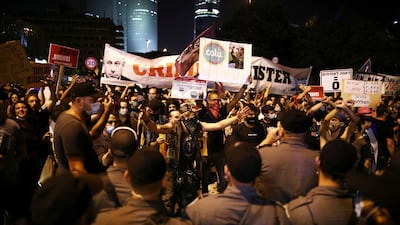Israel's parliament has approved a law restricting demonstrations as part of a coronavirus-related state of emergency that critics said was aimed at silencing protests against Prime Minister Benjamin Netanyahu.
The law, which passed its final reading by 46 votes to 38 on Wednesday, was intended to be one of several measures approved by parliament on Friday that tightened a second nationwide lockdown.
But debate on the measure was put off as the government struggled to secure the required votes in the face of opposition outcry and a protest outside parliament on Tuesday.
The lockdown, which took effect on September 18, closed most workplaces, markets, places of worship, schools and cultural venues.
It also banned journeys of more than a kilometre from home, other than for essential purposes such as buying food and medicine or receiving medical treatment.
The new law gives the government powers to declare a "special emergency caused by the coronavirus pandemic" for renewable periods of one week.
During that time, the one-kilometre limit on travel will apply to demonstrations, and there will also be restrictions on numbers.
The state of emergency can only be declared during a lockdown.
The government has yet to use those powers, but with 243,895 coronavirus infections and 1,552 deaths in a population of nine million, Israel has the world's highest weekly infection rate per capita.
On Wednesday, the health ministry said that 212 patients were on respirators, a record figure since the start of the pandemic in Israel.
Meir Cohen, of main opposition party Yesh Atid-Telem, condemned the new controls on demonstrations as a "slippery slope".
Yair Golan, of the left-wing Meretz party, said that the new law would not stop the demonstrations.
"The anger growing in the streets will find its way out," he said.
In recent months, weekly protests have been held outside Mr Netanyahu's Jerusalem residence, demanding that he resign over his management of the pandemic and his ongoing trial on corruption charges.
Shortly after the measures were finalised, an opposition group, the Movement for Quality Government in Israel, filed a petition at the supreme court to challenge the legality of the measure.
"In the darkness of the night, members of the Knesset brought Israel a step closer to crushing democracy, but we won't let that happen," the movement said in a statement.
"And don't let them say the law is crucial to save people from coronavirus," it said, and pointed out that demonstrations in vehicles where people drive cars in convoy on the streets – where risk of infection was minimal – were prohibited, too.
"There are no health considerations in this legislation, rather a sweeping prohibition on demonstrating against a prime minister accused of bribery, fraud and a breach of trust," the movement said.
On Tuesday, Mr Netanyahu said that this lockdown, originally set to end on October 10, would last "not less than a month, and maybe much more time than that".
At a Cabinet meeting on Wednesday evening focused on the lockdown, Mr Netanyahu said that lifting restrictions will be slow and that it could be between six months and a year until normal life resumes.











